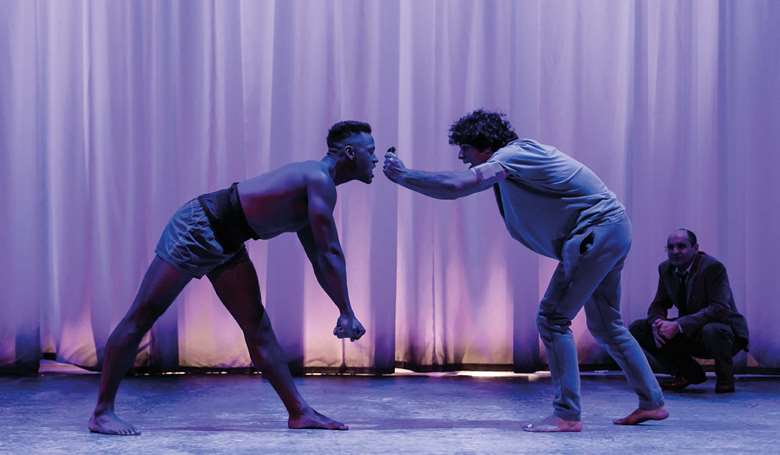Mounting Equus
Rhianna Elsden
Friday, March 1, 2019
Ahead of a new touring production of what is an exam board set-text, Rhianna Elsden chats to director Ned Bennett about character, style and innovation

The Other Richard
The play Equus – a staple of English and Drama curricula and auditions pretty much ever since it was first written by Peter Shaffer in 1973 – has actually been performed relatively little professionally in London. The ‘most recent’ production saw Daniel Radcliffe shed his clothes (and the guise of Harry Potter) to play the central role of Alan back in 2007. In February, Ned Bennett (whose credits include Yen which won him the UKT Best Director award 2015, An Octoroon, 2017 and Buggy Baby, 2018) – and English Touring Theatre (ETT) bring a new, bold production to Theatre Royal Stratford East, before touring.
I spoke to Bennett in week four of Equus rehearsals and asked him firstly why he was inspired to take on the celebrated play: ‘I'm always attracted to plays that explore the primal side of who we are,’ Bennett explained, ‘Despite its notoriety, I'd never encountered the play myself except through people learning monologues for their LAMDA exam, and then I read it and found it really unnerving; it's unsettling the depths which Shaffer is plumbing and the predicaments and problems the characters are faced with’.
Ever-relevant
Bennett also found the play entirely fresh in spite of its publication date being over four decades ago ‘to me it still feels like it has a real uniqueness and originality due to the epic nature in which Shaffer is exploring a cross-over of sexuality and religion and worship – themes which haven't lost any relevance and have only shifted due to Britain becoming an ever-increasingly secular society’. Bennett also felt that he couldn't help but relate it to violence in society now. For example, gun crimes whereby ‘immediately people ask as much about the tendencies within the person as they debate the gun control laws’ which (although not about gun crime) reflects the themes of Equus and the motivations of its lead character Alan.
Schaffer was first inspired to write the play when he heard of a crime involving a boy who had blinded horses in a small town near Suffolk. Rather than research the event and create a documentary play, Shaffer chose to create a fictitious backstory exploring Alan's motives. Moreover, although he was very much the writer for the project, Bennett was fascinated to learn that the material originally came together through a devising process which included the movement director being centrally involved from the start. This was an innovative practice at the National when it was first premiered, leading to ‘visceral territory’ in Bennett's eyes, and a play that is a ‘detective story and a profound philosophical meditation all in one’.
Despite clearly having done a huge amount of research, reflection and planning before undertaking the project, in talking about his own rehearsal methods with the ETT cast Bennett said that every day was still filled with discovery. That very afternoon, for example, he'd been struck by the realisation of the isolation of each character: ‘There's something in the DNA of all the characters that is searching and probing and inquisitive, marred with repression which creates such a sadness floating around all the characters’.
Style choices
The script Bennett and ETT are using for the production is the one that was used in 2007's West End production, which includes updates – for example the adverts that Alan sings whenever locked in complex status battles and facing uncomfortably probing questions from psychiatrist Dysart. Within the updated script Shaffer's precise, stylised ideas for design – the stage set up, the way the horses should be portrayed – remained.
Bennett found the style ‘incredibly satisfying’ in that Shaffer didn't let naturalism get in the way. However, together with designer Georgia Lowe, he came to the rehearsals with a storyboard and ideas that have not necessarily stuck to Shaffer's visual and aural direction. Rehearsals and the collaboration of the ensemble have further added to this enrichment of the text, leading to imagery that is at times ‘unsettling like David Lynch's work’ creating staging that acts as a psychological space that allows for the flow and fluidity of the structure of the script with its flashbacks and so forth.
Bennett further describes the design and staging as ‘immersive and visceral’ clarifying that while they had been given freedom to do what they liked with the new version, innovation wasn't just ‘done for the sake of it.’
Bennett was torn as to whether to go further into detail about the design and acting, and indeed I did find out some spoilers…but seeing this new version with appetite whetted but not too much prior knowledge of the ‘new’ is best for what is going to be an invigorating performance experience of a classic text.

